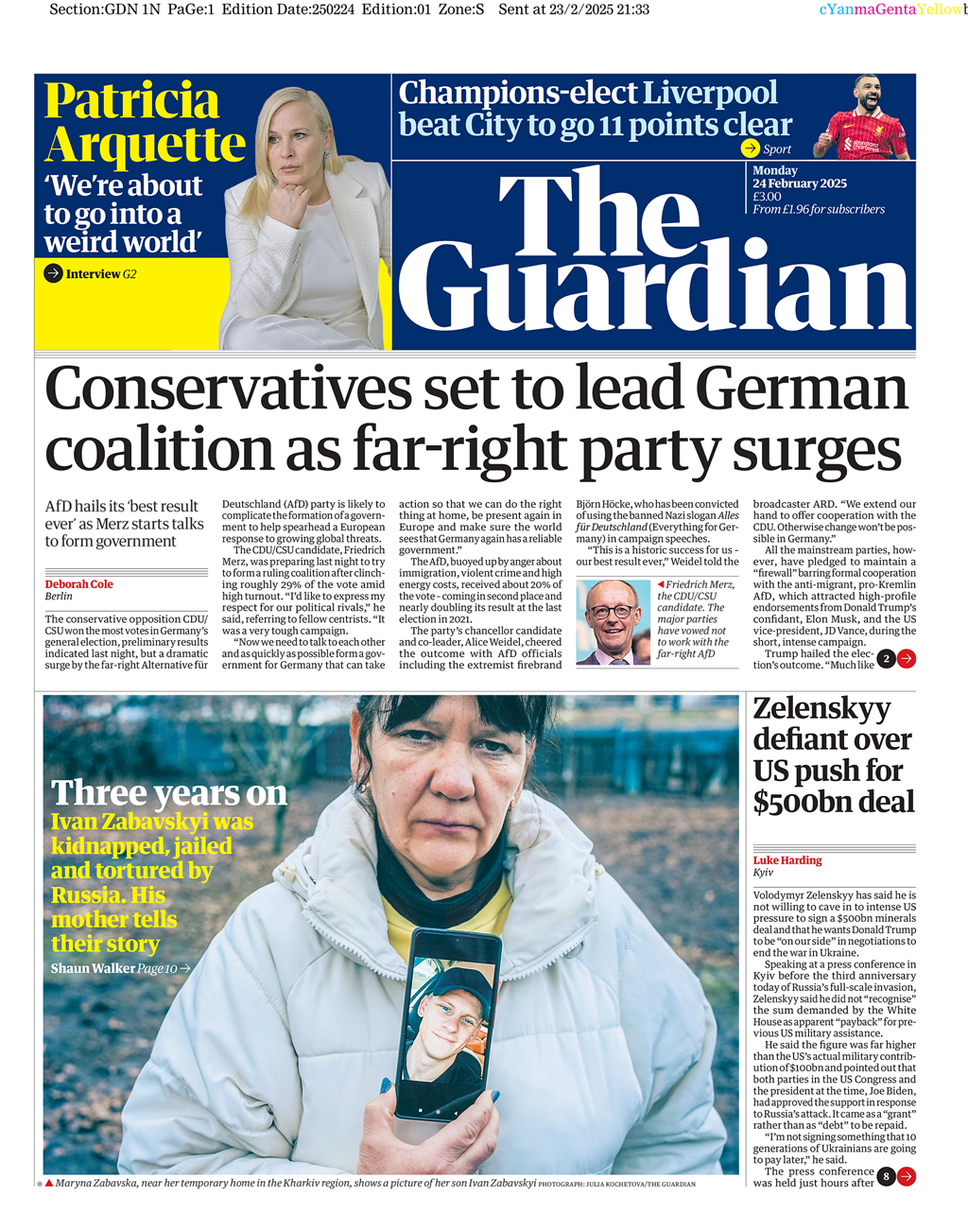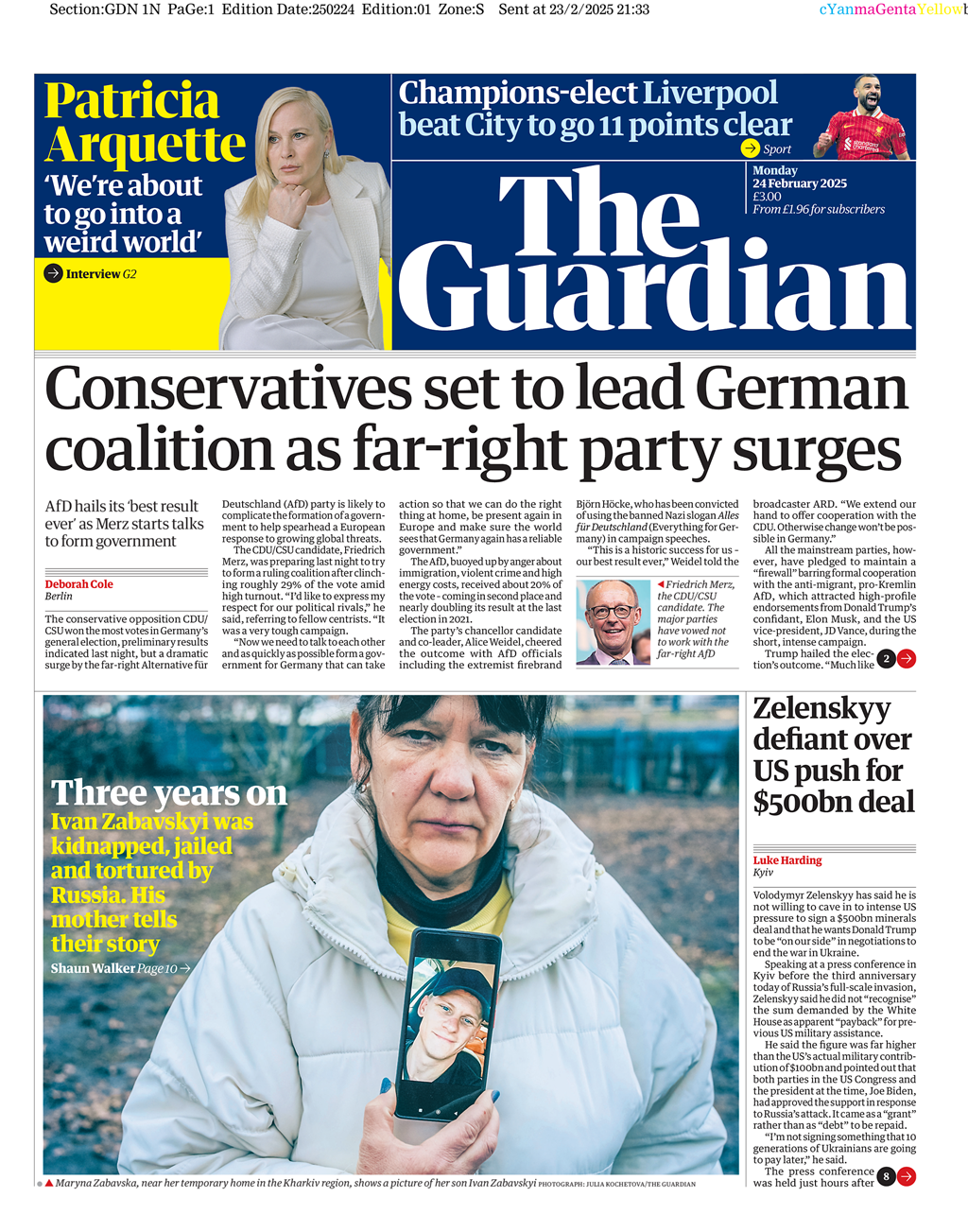AQA A-Level Media Studies - The Guardian
1/14
Earn XP
Description and Tags
Name | Mastery | Learn | Test | Matching | Spaced |
|---|
No study sessions yet.
15 Terms

Front Cover analysis - Headline
Informational
Important to the liberal audience - keeping watch of far right
“surges” - implies sudden rise/violence
‘mainstream’ parties in Germany forming a coalition leaving out AfD
Despite CDU/CSU being conservative they painted them in a positive light
Makes sure to mention AfD parties policies that are the exact opposite of left-wing - “anti-migrant, pro-Kremlin” and affiliations with Trump/Musk

Front cover analysis - other headlines
“Zelensky defiant over US push for $500bn deal” - paints Trump in a poor light. Trump has done nothing to deserve getting money back - it was originally a “grant” and not a loan
Footbal;/sports section - escapism and proximity
A mother’s son was kidnapped and tortured by Russia - Continued narrative of support for Zelenskyy, framing Russia as evil, quotes from family and friends adding an emotional and personal aspect to the story
Aim: “fearless, investigative journalism” and “quality trustworthy reporting”
UK Audiences:
Print - 3.1m a month
Digital - 21.1m a month
Globally - 86m unique browsers each month
Known for it’s progressive views relative to other publications and according to Ofcom is one of the UK’s most trusted news brands
Demographics UK (2023)
11.5m are men
10.5m are women
15.7m are ABC1
7.3m are AB
6.7m are C2DE
Majority of readers are higher earning and more educated
Demographics globally (2023)
In the UK age groups are split evenly around 20% per group
Globally the age group with the largest readership is 25-34
Psychographics
Reformers - Is socially aware and looking for the authentic
Succeeders - Positions of responsibility and looking to maintain the status quo
Could also argue for ‘Mainstream’ as it’s one of the biggest UK newspapers and is fairly conventional in it’s stories and representations
Ownership
Operated by Guardian Media Group (GMG) - British based and also owns The Observer
Parent company is Scott Trust Limited - created in 1936 to preserve the independence of The Guardian
Scott Trust became a limited company to “fit within the current media landscape”
Funding
Due to no shareholders and editorial independence it relies on audience funding
Digital subscription that gives ad free access
‘Patron’ donations - £1,200-£5,000 and donors receive tickets to live events, ad free access, can attend morning editorial conferences etc.
Advertising income - double page spread (£32,400), half page (£11,000) etc. They also claim that they help their “advertising partners to build progressive brands” - progressive by association?
Online advertisements decided by user preferences, cookies, location etc.
Regulation
Independent - “global readers’ editor” and does regular audits
TG feels that IPSO (Independent Press Standards Orginsation) is too similar to the (now shut down) Press Complaints Commission
IPSO
Formed after the Leveson Inquiry and PCC was closed due to lack of action during the News Of The World phone hacking scandal
Common complaints of IPSO include: not enough power and does not take enough action. If a breach of IPSO’s code is found, at most it’s a fine that a big news publication can easily pay off. It’s also not fully compliant with the recommendations of the Leveson Inquiry
The board is also run by people within the newspaper industry - they have experience, but you could also argue that this makes it more likely for them to be biased towards certain papers
The Guardian vs The Daily Mail
TG focuses on hard news - TDM focuses on sensationalist headlines and tabloid journalism
Curran and Seaton would say that TG is unconventional in the way that they are an independent company focused on factual news
Hesmondhalgh - both take advantage of technological convergence
Hesmondhalgh - Cultural Industries
Rise of technological convergence - TG was one of the first to create an online edition. They have been successful and are one of the top online news publications - 21.1m monthly readership online vs 3.1m physically
Changes to their forms of income - creating monthly subscriptions for ad-free reading
Livingstone and Lunt - Regulation is hard during the digital age
By regulating themselves it shows trust to the readers as well as independence - unlike conglomerates they don’t avoid regulation
By limiting sensationalist headlines it shows TG regulation to the citizen over focusing on the monetary
Curran and Seaton
In an industry dominated by small number of conglomerates - TG adds a form of diversity and choice to the industry
Their focus is on news rather than profit and power - shown by them being independently regulated as well as having no shareholders
Shirky - End of Audience
In the age of digital convergence - audiences can be kept engaged with news publications with comment sections on each article
In this case TG only has comments on their opinion pieces - allowing readers to share their similar or contrasting views and start a discussion that allows for diverse view points